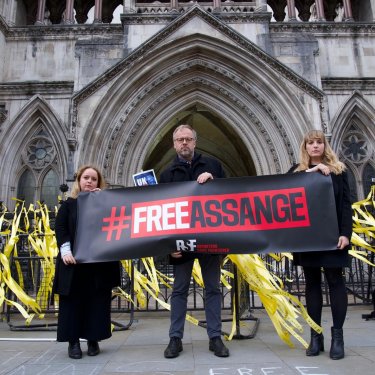UK: High Court grants Julian Assange right to appeal extradition case to the Supreme Court

Reporters Without Borders (RSF) welcomes the High Court’s decision to allow Wikileaks publisher Julian Assange to appeal to the Supreme Court, seeking review of his extradition case, but limited to one narrow ground. The Supreme Court will be asked to consider matters related to the US government’s provision of diplomatic assurances regarding Assange’s treatment if extradited.
On 24 January, the High Court granted Julian Assange the right to appeal to the Supreme Court, seeking review of the decision that could allow for his extradition to the US. Assange’s legal team now has 14 days to file an application with the Supreme Court, which could take several months to decide whether it will accept the case for review.
If accepted, the Supreme Court would consider matters related to the US government’s provision of diplomatic assurances regarding Assange’s treatment, which were filed only prior to the appeal stage of proceedings, meaning the assurances were not scrutinised in the evidentiary portion of the extradition hearing. The High Court granted permission for Assange to file an application on this ground due to the lateness of the US government’s provision of these diplomatic assurances.
“We welcome the High Court’s decision to allow Julian Assange the right to appeal his extradition case to the Supreme Court. This case will have enormous implications for journalism and press freedom around the world, and could be hugely precedent-setting. It deserves consideration by the highest court in the land. We very much hope that the Supreme Court will indeed accept the case for review,” said RSF’s Director of International Campaigns Rebecca Vincent, who was present in court for the hearing.
This decision follows the High Court’s ruling of 10 December 2021 by the same judges, overturning the District Judge’s decision of 4 January 2021 barring extradition on mental health grounds. The High Court had ruled in favour of the US government’s appeal, on the basis of the diplomatic assurances provided regarding Assange’s treatment if extradited.
RSF believes that Assange has been targeted for his contributions to journalism, as Wikileaks’ publication of hundreds of thousands of leaked classified documents in 2010 informed extensive public interest reporting around the world, exposing war crimes and human rights violations that have never been prosecuted. If he faces trial in the US, Assange would not be able to argue a public interest defence, as the Espionage Act lacks such a provision. Assange’s prosecution would set a dangerous precedent that would have lasting implications for journalism and press freedom around the world.
RSF is also gravely concerned by the state of Assange’s mental and physical health, which remain at great risk in conditions of prolonged detention in London’s high-security Belmarsh prison – risks that would be severely exacerbated if the US succeeds in securing his extradition. In December it was revealed that he had suffered a mini-stroke in prison during the appellate hearing, and in January it was reported that Covid infections were again on the rise in Belmarsh prison.
The UK and US are respectively ranked 33rd and 44th out of 180 countries in RSF’s 2021 World Press Freedom Index.



